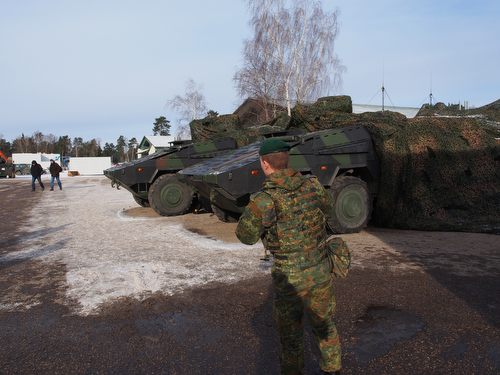Psychologische Kriegführung: Fake News gegen deutsche Soldaten in Litauen
Die deutschen Soldaten, die im Rahmen einer NATO-Battlegroup an der Ostflanke der Allianz in Litauen im Einsatz sind, wurden offensichtlich bereits Ziel psychologischer Kriegführung: Gegen einzelne Bundeswehrsoldaten wurde in den vergangenen Tagen der Vorwurf erhoben, eine Litauerin vergewaltigt zu haben. Das stellte sich nach polizeilicher Untersuchung als falsch heraus – aber es könnte einen Vorgeschmack darauf geben, was die Bundeswehr in der NATO-Mission enhanced Forward Presence noch erwarten könnte.
Das Thema spielte auch am Rande der NATO-Verteidigungsministertagung in Brüssel eine Rolle, in der Pressekonferenz mit Generalsekretär Jens Stoltenberg fragte ein litauischer Kollege des Baltic News Service danach. Aus dem Transkript:
Q: Good afternoon Secretary General. Back to Lithuanian issues actually. There was as Lithuanian authorities call it an information attack against German battle group soldiers in Lithuania yesterday. A person accused them of raping a Lithuania girl and later the police found that the accusations were fake. Do you see it as a problem and how would you identify it and can enhanced forward presence lose credibility because of these attacks? Do NATO need to step up in order to counter such information attacks? Thank you.
JENS STOLTENBERG: We have seen the reports but we have also seen the reports that Lithuanian police investigated and soon discovered that this was not the case, it was not true.
And I think it’s a good thing that the public, the media in Lithuania checked the facts and I think that one of the important lessons we shall learn from this kind of incident is that it is extremely important to check facts, for all of us, of course for politicians but also for media. That has always been the case but it’s perhaps even more important now because we have seen several attempts of disinformation and the spread of stories which are not true.
So what NATO can do is of course to always be vigilant, always be focused on our resilience, our ability to counter many different kinds of attacks. Also when it comes to propaganda we can provide facts, we will never counter propaganda with propaganda, we will counter propaganda with facts because we believe strongly that in the long run the truth will prevail over propaganda. But I think it also underlines the importance of the role media … the media plays because a free media, open debate is a core value for this alliance and when we see that that is under attack in many different ways it is important that the media continues to be independent, continues to be critical and continues to check facts.
Nach einem Bericht des Spiegels sagte ein NATO-Diplomat in Brüssel , der Vorfall werde als russischer Versuch gesehen , den gerade begonnenen Einsatz in Litauen zu unterminieren und Stimmung gegen die Allianz zu machen.
Nachtrag: Solche Szenarien waren von Wissenschaftlern bereits vorhergesagt worden, zum Beispiel vom Center for Security Studies der ETH Zürich (danke für den Leserhinweis):
NATO troops will have to interact with the civilian population of the host countries. At some point, this interaction will see the statistically normal occurrence of local ‘casualties’ – through accidents with civilian traffic, or through (real or alleged) crimes. Tragic events like these are always a possibility when thousands of young men and women are living in a foreign environment, and they can have a signficant effect on the attitude of the host nation, even if not amplified by a hostile and concerted media campaign.(…) Any such event, even if only based on rumors, could very easily, and very effectively, be exploited by Russian propaganda efforts to influence public opinion within the Russian-speaking minorities, Russia proper, and the troop-contributing nation.
Und noch ein Nachtrag zum Wiederfinden, ein Bericht vom 23. Februar: Die Brüsseler Kollegin Teri Schultz hat für die Deutsche Welle aufgeschrieben, warum vermutlich dieser Angriff nicht erfolgreich war:
Why the ‚fake rape‘ story against German NATO forces fell flat in Lithuania
But whether or not this particular attempt is ultimately traceable to Kremlin-funded propagandists, Vilnius was expecting such provocations. With reinforcements of NATO troops moving in to guard against a ground or air assault, Lithuanian officials presumed that sooner or later, an information attack of this sort would be launched against the „Enhanced Forward Presence“ (EFP). Lithuania’s Defense Ministry Spokeswoman Vita Ramanauskaite explains her country’s fatalistic anticipation in two words: „history lessons.“
(Foto: Mobiler Bataillonsgefechtsstand des Panzergrenadierbataillons 122 in Rukla in Litauen)




Letzte Kommentare